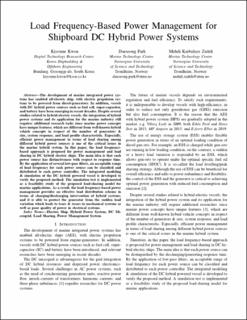| dc.contributor.author | Kwon, Kiyoune | |
| dc.contributor.author | Park, Daeseong | |
| dc.contributor.author | Zadeh, Mehdi | |
| dc.date.accessioned | 2021-02-16T15:51:59Z | |
| dc.date.available | 2021-02-16T15:51:59Z | |
| dc.date.created | 2021-01-18T18:28:32Z | |
| dc.date.issued | 2020 | |
| dc.identifier.issn | 2163-5145 | |
| dc.identifier.uri | https://hdl.handle.net/11250/2728511 | |
| dc.description.abstract | The development of marine integrated power systems has enabled all-electric ship, with electric propulsion systems to be powered from diesel-generators. In addition, vessels with DC hybrid power sources such as fuel cell, super-capacitor, and battery have been emerging in recent decades. Despite several studies related to hybrid-electric vessels, the integration of hybrid power systems and its application for the marine industry still requires additional research tasks since marine power concepts have unique features, which are different from well-known hybrid vehicle concepts in respect of the number of generators & size, system response, and load profile characteristic. Especially, efficient power management in terms of load sharing among different hybrid power sources is one of the critical issues in the marine hybrid system. In this paper, the load frequency-based approach is proposed for power management and load sharing in DC hybrid electric ships. The main idea is that each power source has distinctiveness with respect to response time. By the application of several low-pass filters, an acceptable range of load frequency for each power source can be classified and distributed to each power controller. The integrated modeling & simulation of the DC hybrid powered vessel is developed to verify the proposed method. The simulation test is implemented as a feasibility study of the proposed load-sharing model for marine applications. As a result, the load frequency-based power management provides an effective load distribution scheme in terms of charging/discharging intervention of hybrid systems, and it is able to protect the generator from the sudden load variation which leads to tears & wears in mechanical systems as well as poor quality of power in electrical systems. | en_US |
| dc.language.iso | eng | en_US |
| dc.publisher | IEEE | en_US |
| dc.title | Load Frequency-Based Power Management for Shipboard DC Hybrid Power Systems | en_US |
| dc.type | Peer reviewed | en_US |
| dc.type | Journal article | en_US |
| dc.description.version | acceptedVersion | en_US |
| dc.source.journal | Proceedings of the IEEE International Symposium on Industrial Electronics | en_US |
| dc.identifier.doi | 10.1109/ISIE45063.2020.9152418 | |
| dc.identifier.cristin | 1873655 | |
| dc.description.localcode | © 2020 IEEE. Personal use of this material is permitted. Permission from IEEE must be obtained for all other uses, in any current or future media, including reprinting/republishing this material for advertising or promotional purposes, creating new collective works, for resale or redistribution to servers or lists, or reuse of any copyrighted component of this work in other works. | en_US |
| cristin.ispublished | true | |
| cristin.fulltext | postprint | |
| cristin.qualitycode | 1 | |
